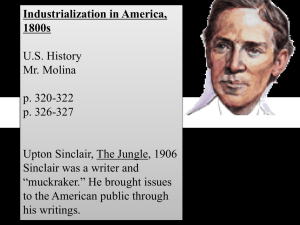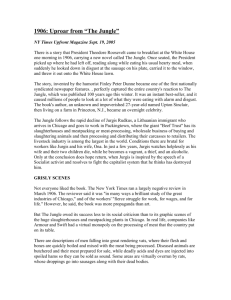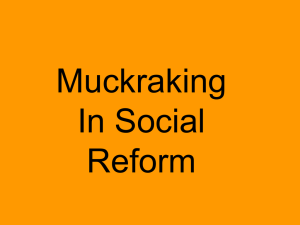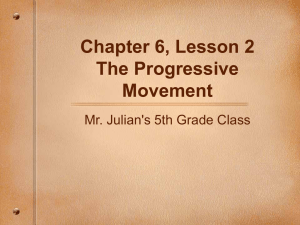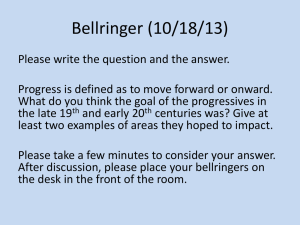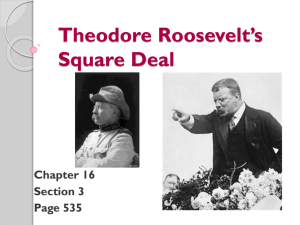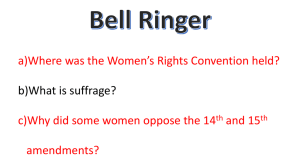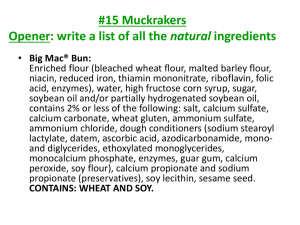The Jungle
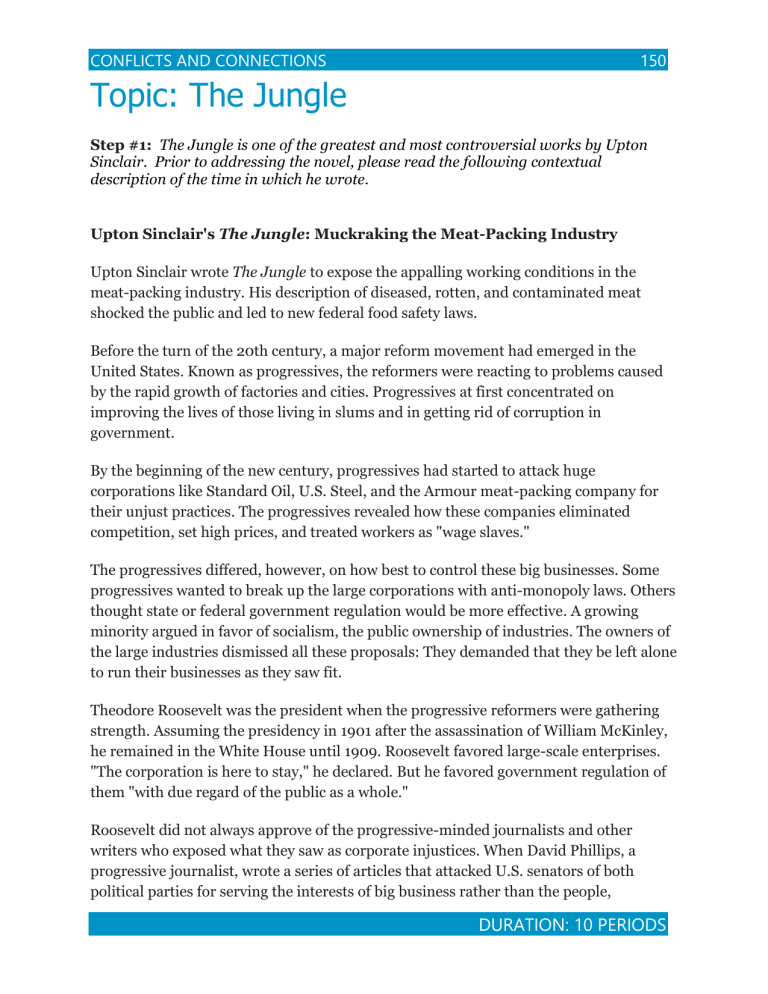
CONFLICTS AND CONNECTIONS
Topic: The Jungle
150
Step #1: The Jungle is one of the greatest and most controversial works by Upton
Sinclair. Prior to addressing the novel, please read the following contextual description of the time in which he wrote.
Upton Sinclair's The Jungle: Muckraking the Meat-Packing Industry
Upton Sinclair wrote The Jungle to expose the appalling working conditions in the meat-packing industry. His description of diseased, rotten, and contaminated meat shocked the public and led to new federal food safety laws.
Before the turn of the 20th century, a major reform movement had emerged in the
United States. Known as progressives, the reformers were reacting to problems caused by the rapid growth of factories and cities. Progressives at first concentrated on improving the lives of those living in slums and in getting rid of corruption in government.
By the beginning of the new century, progressives had started to attack huge corporations like Standard Oil, U.S. Steel, and the Armour meat-packing company for their unjust practices. The progressives revealed how these companies eliminated competition, set high prices, and treated workers as "wage slaves."
The progressives differed, however, on how best to control these big businesses. Some progressives wanted to break up the large corporations with anti-monopoly laws. Others thought state or federal government regulation would be more effective. A growing minority argued in favor of socialism, the public ownership of industries. The owners of the large industries dismissed all these proposals: They demanded that they be left alone to run their businesses as they saw fit.
Theodore Roosevelt was the president when the progressive reformers were gathering strength. Assuming the presidency in 1901 after the assassination of William McKinley, he remained in the White House until 1909. Roosevelt favored large-scale enterprises.
"The corporation is here to stay," he declared. But he favored government regulation of them "with due regard of the public as a whole."
Roosevelt did not always approve of the progressive-minded journalists and other writers who exposed what they saw as corporate injustices. When David Phillips, a progressive journalist, wrote a series of articles that attacked U.S. senators of both political parties for serving the interests of big business rather than the people,
DURATION: 10 PERIODS
CONFLICTS AND CONNECTIONS 150
President Roosevelt thought Phillips had gone too far. He referred to him as a man with a "muck-rake."
Even so, Roosevelt had to admit, "There is filth on the floor, and it must be scraped up with the muck-rake." The term "muckraker" caught on. It referred to investigative writers who uncovered the dark side of society.
Few places had more "filth on the floor" than the meat- packing houses of Chicago.
Upton Sinclair, a largely unknown fiction writer, became an "accidental muckraker" when he wrote a novel about the meat-packing industry.
Packingtown
By the early 1900s, four major meat-packing corporations had bought out the many small slaughterhouse companies throughout the United States. Because they were so large, the Armour, Swift, Morris, and National Packing companies could dictate prices to cattle ranchers, feed growers, and consumers.
The Big Four meat-packing companies centralized their operations in a few cities.
Largest of all was the meat-packing industry in Chicago. It spread through acres of stockyards, feed lots, slaughterhouses, and meat-processing plants. Together with the nearby housing area where the workers lived, this part of Chicago was known as
Packingtown.
Long before Henry Ford adapted it to automobile production, meat packers had developed the first industrial assembly line. It was more accurately a "disassembly line," requiring nearly 80 separate jobs from the killing of an animal to processing its meat for sale. "Killing gangs" held jobs like "knockers," "rippers," "leg breakers," and "gutters."
The animal carcasses moved continuously on hooks until processed into fresh, smoked, salted, pickled, and canned meats. The organs, bones, fat, and other scraps ended up as lard, soap, and fertilizer. The workers said that the meat-packing companies "used everything but the squeal."
Unskilled immigrant men did the backbreaking and often dangerous work, laboring in dark and unventilated rooms, hot in summer and unheated in winter. Many stood all day on floors covered with blood, meat scraps, and foul water, wielding sledgehammers and knives. Women and children over 14 worked at meat trimming, sausage making, and canning.
Most workers earned just pennies per hour and worked 10 hours per day, six days a week. A few skilled workers, however, made as much as 50 cents an hour as
DURATION: 10 PERIODS
CONFLICTS AND CONNECTIONS
"pacesetters," who sped up the assembly line to maximize production. The use of pacesetters caused great discontent among the workers.
150
By 1904, most of Chicago's packing-house workers were recent immigrants from
Poland, Slovakia, and Lithuania. They crowded into tenement apartments and rented rooms in Packingtown, next to the stinking stockyards and four city dumps.
Real estate agents sold some immigrants small houses on credit, knowing that few would be able to keep up with the payments due to job layoffs, pay cuts, or disabling injuries. When an immigrant fell behind in payments, the mortgage holder would foreclose, repaint, and sell the house to another immigrant family.
Upton Sinclair
Born in Baltimore in 1878, Upton Sinclair came from an old Virginia family. The Civil
War had wiped out the family's wealth and land holdings. Sinclair's father became a traveling liquor salesman and alcoholic. The future author's mother wanted him to become a minister. At age 5, he wrote his first story. It told about a pig that ate a pin, which ended up in a family's sausage.
When he was 10, Sinclair's family moved to New York City where he went to school and college. While attending Columbia University, he began to sell stories to magazines. He specialized in western, adventure, sports, and war-hero fiction for working-class readers.
Sinclair graduated from Columbia in 1897, and three years later he married Meta Fuller.
They had one child. Sinclair began to write novels but had difficulty getting them published.
As he was struggling to make a living as a writer, he began reading about socialism. He came to believe in the idea of a peaceful revolution in which Americans would vote for the government to take over the ownership of big businesses. He joined the Socialist
Party in 1903, and a year later he began to write for Appeal to Reason, a socialist magazine.
In 1904, the meat-packer's union in Chicago went on strike, demanding better wages and working conditions. The Big Four companies broke the strike and the union by bringing in strikebreakers, replacements for those on strike. The new workers kept the assembly lines running while the strikers and their families fell into poverty.
The editor of Appeal to Reason suggested that Sinclair write a novel about the strike.
Sinclair, at age 26, went to Chicago at the end of 1904 to research the strike and the
DURATION: 10 PERIODS
CONFLICTS AND CONNECTIONS 150 conditions suffered by the meat-packing workers. He interviewed them, their families, lawyers, doctors, and social workers. He personally observed the appalling conditions inside the meat-packing plants.
Source: Constitutional Rights Foundation, Bill of Rights in Action, Fall 2008 (Volume
24, No. 1), “Upton Sinclair's The Jungle: Muckraking the Meat-Packing Industry”
(http://www.crf-usa.org).
Step #2: After reading The Jungle, please consider and answer 4 of the following questions:
1.
What is important about the title?
2.
What are the conflicts in The Jungle? What types of conflict (physical, moral, intellectual, or emotional) did you notice in this novel?
3.
What are some themes in the novel? How do they relate to the plot and characters?
4.
What are some symbols in The Jungle? How do they relate to the plot and characters?
5.
Is Jurgis Rudkus consistent in his actions? Do you feel he is he a fully developed character? How? Why?
6.
Do you find the characters likable? Are the characters persons you would want to meet?
7.
Does the novel end the way you expected? How? Why?
8.
What is the central/primary purpose of the novel? Is the purpose important or meaningful?
9.
Why is the novel usually considered a work of protest literature? Feel free to expand your understanding of the novel by researching the context of the times in which the novel was written.
10.
How essential is the setting to the story? Could the story have taken place anywhere else?
11.
What is the role of women in the text? How are mothers represented? What about single/independent women?
12.
Would you recommend this novel to a friend?
DURATION: 10 PERIODS
CONFLICTS AND CONNECTIONS 150
Step #3: Read the information below about the impact Sinclair’s book had on US laws.
After the Publication of the Jungle
The White House was bombarded with mail, calling for reform of the meat-packing industry. After reading The Jungle, President Roosevelt invited Sinclair to the White
House to discuss it. The president then appointed a special commission to investigate
Chicago's slaughterhouses.
The special commission issued its report in May 1906. The report confirmed almost all the horrors that Sinclair had written about. One day, the commissioners witnessed a slaughtered hog that fell part way into a worker toilet. Workers took the carcass out without cleaning it and put it on a hook with the others on the assembly line.
The commissioners criticized existing meat-inspection laws that required only confirming the healthfulness of animals at the time of slaughter. The commissioners recommended that inspections take place at every stage of the processing of meat. They also called for the secretary of agriculture to make rules requiring the "cleanliness and wholesomeness of animal products."
President Roosevelt called the conditions revealed in the special commission's report
"revolting." In a letter to Congress, he declared, "A law is needed which will enable the inspectors of the [Federal] Government to inspect and supervise from the hoof to the can the preparation of the meat food product."
Roosevelt overcame meat-packer opposition and pushed through the Meat Inspection
Act of 1906. The law authorized inspectors from the U.S. Department of Agriculture to stop any bad or mislabeled meat from entering interstate and foreign commerce. This law greatly expanded federal government regulation of private enterprise. The meat packers, however, won a provision in the law requiring federal government rather than the companies to pay for the inspection.
Sinclair did not like the law's regulation approach. True to his socialist convictions, he preferred meat-packing plants to be publicly owned and operated by cities, as was commonly the case in Europe.
Passage of the Meat Inspection Act opened the way for Congress to approve a longblocked law to regulate the sale of most other foods and drugs. For over 20 years,
Harvey W. Wiley, chief chemist at the Department of Agriculture, had led a "pure food crusade." He and his "Poison Squad" had tested chemicals added to preserve foods and
DURATION: 10 PERIODS
CONFLICTS AND CONNECTIONS found many were dangerous to human health. The uproar over The Jungle revived
Wiley's lobbying efforts in Congress for federal food and drug regulation.
150
Roosevelt signed a law regulating foods and drugs on June 30, 1906, the same day he signed the Meat Inspection Act. The Pure Food and Drug Act regulated food additives and prohibited misleading labeling of food and drugs. This law led to the formation of the federal Food and Drug Administration (FDA).
The two 1906 laws ended up increasing consumer confidence in the food and drugs they purchased, which benefitted these businesses. The laws also acted as a wedge to expand federal regulation of other industries, one of the strategies to control big business pursued by the progressives.
Step #4: Analysis Paper: Look at a contemporary problem in the community, state, or nation. Investigate it. Write a 2-3 page editorial on what should be done about it.
DURATION: 10 PERIODS
